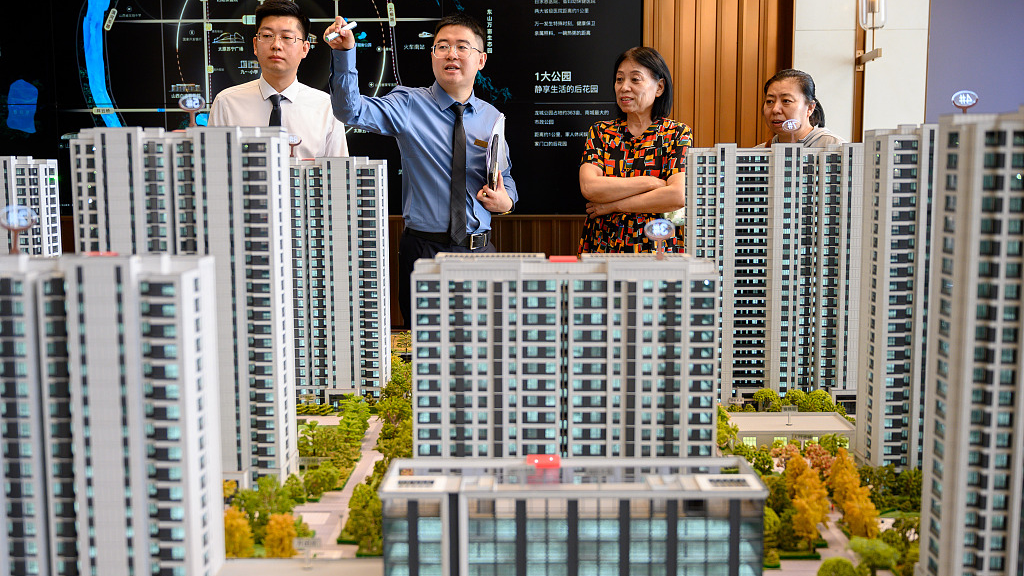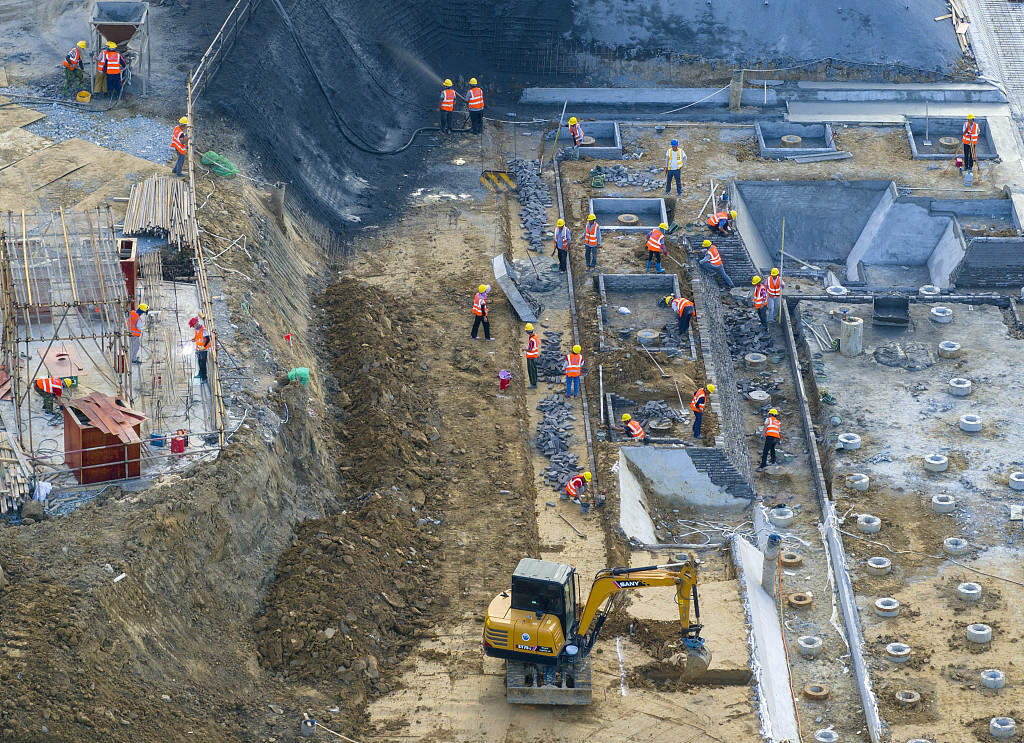
Salesmen introduce commercial housing to their customers in Taiyuan, north China's Shanxi Province, June 21, 2023. /CFP
Salesmen introduce commercial housing to their customers in Taiyuan, north China's Shanxi Province, June 21, 2023. /CFP
Editor's note: Djoomart Otorbaev, a special commentator for CGTN, is a former Prime Minister of the Kyrgyz Republic, a distinguished professor of the Belt and Road School of Beijing Normal University, a member of Nizami Ganjavi International Center, and the author of the book "Central Asia's Economic Rebirth in the Shadow of the New Great Game"(Routledge, 2023). The article reflects the author's views and not necessarily those of CGTN.
The real estate market in China saw a further drop in home sales in July, putting pressure on the central and municipal governments to act and restore confidence. As per initial findings from China Real Estate Information Corporation, reported on 31 July, new home sales by the 100 leading developers have declined by 33.1 percent year-on-year to 350.4 billion Chinese yuan ($49 billion). Sales have declined by 33.5 percent from the previous month. The total sales for the year's first seven months decreased 4.7 percent from the last year to 3.4 trillion yuan ($474 million).
On August 1, the cancellation of the largest Chinese developer Country Garden's share placement indicated the challenge in the country's real estate sector. The company abruptly withdrew its offer to raise $300 million through a new share issue. As a result, its shares fell 11 percent on the Hong Kong Stock Exchange.
As reported by financial advisor Wind Information, as of June, Chinese developers, including those who deferred payments, defaulted on bonds worth 212.4 billion yuan ($39 billion). Tianfeng Securities also states that their domestic and foreign debt amounts to 2.54 trillion yuan ($354 million) this year. Among the troubled developers is the aforementioned Country Garden, which incurred a net loss of 6.1 billion yuan ($850 million) last year, a sharp contrast to the previous year's profit of 27 billion yuan ($3.8 billion).
There is a growing concern in the housing market due to recent news that the People's Bank of China (PBoC) has reported a decrease in outstanding mortgage loans. According to the PBoC's quarterly report released on 28 July, personal mortgage loans dropped by 0.7 percent to a total of 38.6 trillion yuan ($5.4 trillion) in the second quarter compared to the previous year, which marks the first annualized decline in 19 years since the central bank began recording data in 2004.
Homeownership is highly valued in China as it is some families' most significant goal and asset. Therefore, supporting a thriving housing market in the country is vital. According to a survey conducted by the PBoC in 2019, urban households' primary assets are housing, making up 59 percent of their total assets. Mortgage loans account for 12 percent of their assets.
Official statistics indicate that the real estate sector contributes 6-7 percent of China's GDP. Still, the actual volume of real estate transactions is much higher. According to renowned economist Kenneth Rogoff and his team, the real estate industry and associated endeavors comprise 29 percent of China's GDP. According to CaixaBank's data, approximately 30 percent of China's GDP can be attributed to the entire supply chain and its inputs, which is twice the percentage in the U.S.

A real estate construction site in Huai'an, east China's Jiangsu Province, August 1, 2023. /CFP
A real estate construction site in Huai'an, east China's Jiangsu Province, August 1, 2023. /CFP
The troubles in the real estate market became intense and peaked in the summer of 2022. Distressed borrowers are struggling to make payments. In response, the PBoC has become more involved in the markets to ensure developers have sufficient funds to complete unfinished homes, and homebuyers have been incentivized with low mortgage rates. While the new policies have had some success, they have also resulted in unintended consequences. Some homeowners who obtained mortgages before minimum interest rates were implemented would pay higher rates than new borrowers. It has caused them to feel dissatisfied, as they are being penalized for purchasing their homes too early.
Unlike in many other markets, mortgage refinancing previously was not commonly used in China. But there are upcoming positive changes in this regulation as well. To address the concerns of unhappy borrowers, the PBoC and the State Administration of Foreign Exchange on August 1 announced their plan to encourage commercial banks to reduce mortgage rates for all borrowers. Additionally, they pledged to lower the down payment for their purchases, which will significantly alleviate household financial stress.
The government has also recently decided to speed up the implementation of measures to stabilize the markets. At the State Council meeting on July 31, Premier Li Qiang pledged to make necessary policy adjustments and optimizations to promote the healthy and stable development of the real estate market. He emphasized that cities could implement measures that meet their needs.
The Chinese real estate industry, which accounts for about a third of the country's economy, is experiencing a downturn after a brief rebound following the lifting of COVID-19 restrictions. Consumers are cautious, and developers often need help to fulfill their obligations.
Recent data suggest that the government plans to take decisive steps to encourage home buying and stabilize the property market. The industry has a good chance of recovery, but it needs prompt and practical regulatory support. It's crucial to implement policy measures that will produce immediate results and have a lasting impact on this critical sector of the Chinese economy.
(If you want to contribute and have specific expertise, please contact us at opinions@cgtn.com. Follow @thouse_opinions on Twitter to discover the latest commentaries in the CGTN Opinion Section.)